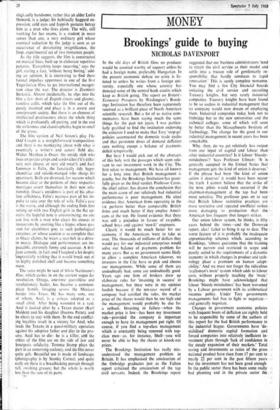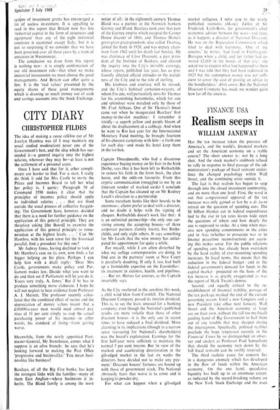Brookings' guide to buying
MONEY
NICHOLAS DAVENPORT
In the old days of British films no producer would be counted worthy of support unless he had a foreign name, preferably Hungarian. In the present economic debate no critic is lis- tened to unless he writes from a foreign uni- versity, especially one whose country has donated some of the central bank credits which keep us British going. The report on Britain's Economic Prospects by Washington's Brook- ings Institution has therefore been rapturously received as a brilliant piece of North American scientific research. But a lot of us native com- mentators have been saying much the same things for the past ten years. I was particu- larly gratified to find the institution endorsing the criticism I used to make that Tory `stop-go' policies accentuated the domestic trade cycles and that persistent doses of demand deflation cure nothing except a balance of payments deficit temporarily.
But here I would pick out of the abstracts of this holy writ the passages which seem rele- vant to our investment work in the City. The first relate to management. We have all known for -a long time that British management is patchy, but the Brookings Institution has grace- fully given us the final verdict. Professor Caves. the chief editor, has drawn the conclusion that the main cause of our relatively bad industrial performance is poor management. He cited evidence that American firms operating in the trx perform better than comparable British firms and much better if they employ Ameri- cans at the top. He found evidence that there was still a prejudice in favour of ex-public school boys and against `non-U' engineers.
Clearly it would be much better for our economy if the Americans were to take us over. The thousands of millions of dollars they would pay for our industrial enterprises would solve our balance of payments problem for many years. But as no government seems likely to allow a complete American takeover, we investors in the City have to pick and choose our managements. While some of them are undoubtedly bad, some are undoubtedly good. Years ago one firm of brokers drew up elaborate rules for `investing in success' in management, but these were in my opinion foolish because if the ten-year record of a company had satisfied the rules, the market price of the shares would then be too high and the management would probably be due for a setback. Investing in failure—when the market price is low—has been my investment rule—provided the company is important enough to have its management put right. Of course, if you find a top-class management which is constantly being Tenewed with top- class men—as, for instance, Shell—you will never be able to buy the shares at knock-out prices.
The Brookings Institution has really mis- understood the management problem in Britain. It has emphasised the amateurism .of the Oxbridge graduates just as the Fulton report criticised the amateurism of the top civil servants. Indeed, the Brookings report suggested that our business administrators `tend to retain the civil service as their model and settle into a trustee role of gentlemanly re- sponsibility that hardly conduces to rapid innovation.' This is surely complete nonsense. You may find a few City financial boards imitating the civil service and recruiting Treasury knights, but very rarely industrial companies. Treasury knights have been found to be so useless in industrial management that no company would now dream of employing them. Industrial companies today look not to Oxbridge but to the new universities and the technical colleges, some of which will soon be better than the Massachusetts Institute of Technology. The change for the good in our industrial management in recent years has been remarkable.
Why, then, do we get relatively less output from our input of capital and labour than .h other industrial countries? Is it labour 'bloody- mindedness'? Says Professor Ulman: 'It is generally accepted in the United States that management gets the kind of union it deserves.' If the phrase had been 'the kind of union action it deserves' it would have been nearer the truth. I cannot believe that the strike of the BOAC pilots would have occurred if the chairman-management at the top had been more sensitive. The professor goes on to say -that British labour restrictive practices are more restrictive and repeated unofficial strikes more damaging to production -than - the American less frequent (but longer) strikes.
Our union labour system, he thinks, is fifty years behind the times—and the Donovan report, alas! failed to bring it up to date. The worst feature of it is probably the inadequate apprenticeship schemes which, according to Brookings, 'almost guarantee that the training will be narrow and restricted in scope and poorly suited to the requirements of a dynamic economy in which changes in product and tech- nology place a premium on human adapt- ability.' And we must not forget the ridiculous `craftsman's mate' system which adds to labour - costs without properly teaching the 'mate.' Brookings might have acknowledged that labour 'bloody-mindedness' has been worsened by a Labour government with its arithmetical incomes policy. Under Tory governments managements feel free to fight or negotiate— and generally negotiate.
Changes in government economic policies with frequent bouts of deflation are rightly held to be responsible by some of the authors of this report for the bad British performance in the industrial league. Governments have 'de- stabilised' domestic capital formation and forced companies into relatively inefficient in- vestment plans through 'lack of confidence in - the steady expansion of their markets.' Total saving and investments as ratios of the gross national product have risen from 17 per cent to . nearly 22 per cent in the past fifteen years but the investment has not been good enough. In the public sector there has been some really bad planning and in the private sector the systpm of investment grants has encouraged a lot of useless investment. It is appalling to read in this report that Britain now has less 'industrial capital in the form of structures and equipment' than any of the eight industrial countries it examined except Italy; but it is not so surprising if we consider that we have been governed over all those years by a team of amateurs in Westminster.
The conclusion we draw from this report is nothing new: it is simply confirmation of our old investment rule—that when we make industrial investments we must choose the good managements. And Britain can offer quite a few. It is the 'real values' presented by the equity shares of these good managements which is drawing so much money out of cash and savings accounts into the Stock Exchange.











































 Previous page
Previous page